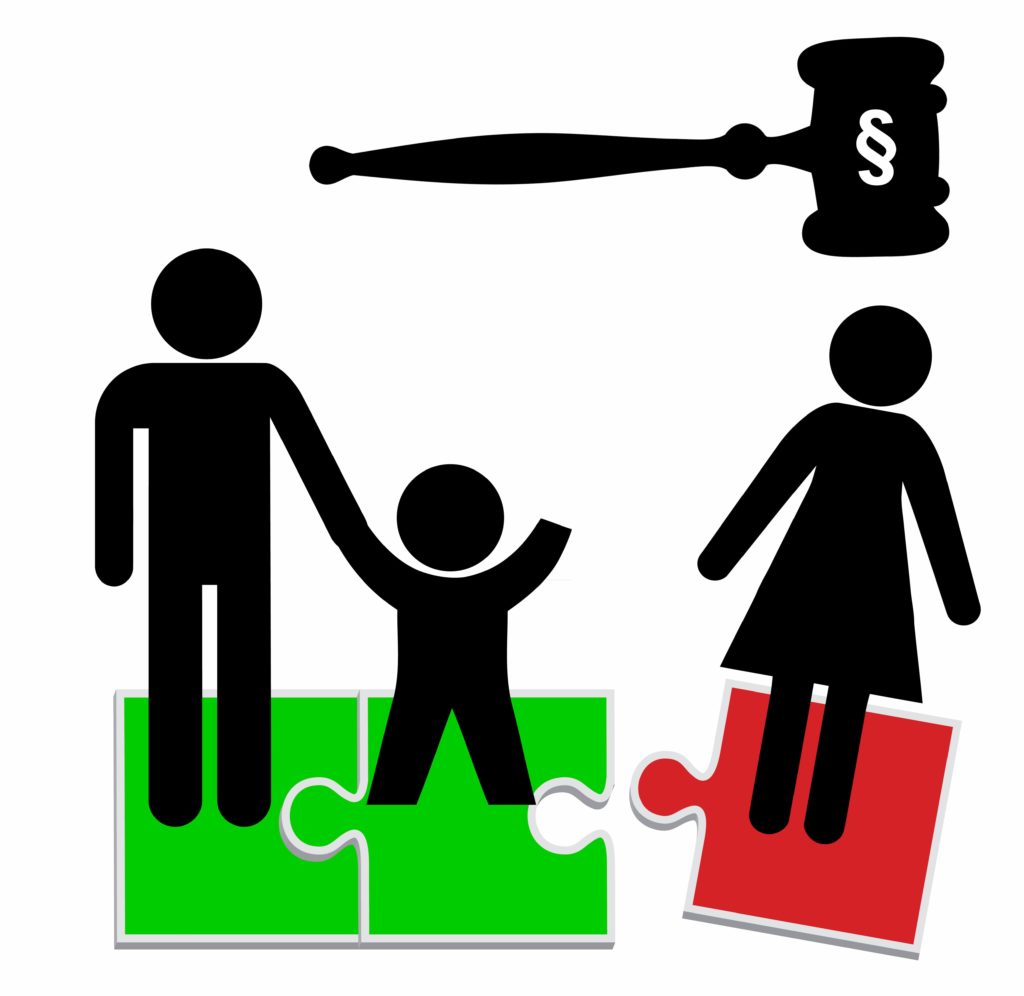There was once a time when, during divorce, a mother would automatically have custody of her children. But now that things are changing, you might be asking: how can a mother lose a custody battle for her child? Is it possible to lose custody of your children even when you’ve been raising them yourself all this time?
Although the increase in the number of fathers gaining custody of their children during a divorce (or separation from their partner) isn’t exceptionally high, the possibility of this happening in your case still might cause you stress. After all, even if you’ve been awarded custody of your children, that decision can still be reversed if your ex challenges your rights to custody based on specific grounds.
So, if you’re worried about the possibility of losing your right to child custody and no longer being able to care for your children, you need to know what factors can lead to that.

How can a mother lose custody of her child in 8 simple steps
There are many reasons why a mother can lose custody of her child or children, and all of them are serious grounds. However, these allegations are not taken lightly, and the burden of proof lies in the party seeking custody reversal.
Still, some mothers have had their custodial rights revoked because they made the mistake of committing any of these transgressions.
1. Child abuse
A mother who is proven to have physically and or psychologically abused her children is highly likely to lose custody of her children. Examples of physical abuse include hitting, kicking, scratching, biting, burning, physical torture, sexual abuse, or any other type of injury inflicted on the child by the mother.
Psychological, emotional, or verbal abuse is usually manifested in many ways, including the following:
- Rejecting the child or making them feel worthless or useless
- Demeaning, ridiculing, humiliating the child
- Terrorizing a child through threats of physical violence, destruction of their possessions, or abandonment
- Isolating a child or preventing them from socializing with others
- Exploiting, manipulating, or corrupting a child or encouraging them to engage in deviant or inappropriate behavior
- Ignoring or being indifferent to the child
Note that even if a child is unable to articulate the psychological abuse, child psychologists, social workers, and other experts also look for social and behavioral signs of abuse. These include problems in school, sleep and or eating disorders, depression, anxiety, anger management problems, and rebellious behavior.
When the court receives sufficient evidence of a mother’s abusive conduct, it is authorized to change current custody arrangements if doing so will be in the children’s best interests.
2. Violence at home
If it is reported that the mother is abusing other members of the household (not the children), she can still lose her custodial rights.
Domestic violence is not something children should be exposed to, as this can harm their psychological development. Moreover, domestic abuse can escalate anytime, thereby exposing the children to potential harm. So if the mother is proven to engage in such abuse, she can have her custody revoked.
3. Fabricating lies about abuse
A mother making false allegations of abuse against the other parent can lose custody if it is proven that the accusations are all fabricated. It will be much worse if it is discovered that she used her children to deceive whoever has investigated her allegations, as well as the lawyers and the court. This could lead to not only the loss of a mother’s right to custody but also visitation rights.
4. Serious neglect
Neglecting to provide the basic needs of your child, including access to health and education, is also a ground your ex can use to reverse the court’s decision to grant you custody.
Child neglect is actually a form of abuse, and it encompasses other things like:
- Not providing shelter
- Not keeping your child clean and well-groomed
- Not supervising your child
- Not taking your child to important scheduled appointments
Children who are left to their own devices become unduly exposed to danger or threats to their safety. They can contract a disease and are also at a higher risk of developing mental illness.
Here, you need to remember that minor or rare infractions, such as being late to pick the children up from school or not being able to keep a routine doctor’s appointment, won’t automatically lead you to lose custody. These things can happen to anyone, and the court understands this. Long-term, consistent neglect is something else, and if it threatens your children’s well-being, the court can intervene.
5. Severe mental health issues
Mothers (or parents in general) who have mental health issues are not automatically disqualified from having custody of their children. However, according to Mental Health America: “Custody loss rates for parents with mental illness range as high as 70-80 percent, and a higher proportion of parents with serious mental illnesses lose custody of their children than parents without mental illness.”
Then again, the other parent needs to provide the court sufficient proof showing that the mother’s mental state or psychological issues compromise the safety of their children. Also, since matters like these are sensitive and grave, the court may require parents to undergo psychological testing, as well as counseling and interviews by experts, before making any decision.
6. Drug and alcohol abuse
A mother who is proven to have demonstrated a dependency on prohibited substances or drugs and or alcohol runs the risk of getting her custody and visitation rights revoked. If a mother has these addictions, it puts to question her fitness and ability to care for their children. Moreover, children of drug addicts and or alcoholics have a higher risk of suffering from neglect, being abused, and imitating their parent’s behavior by picking up similar bad habits.
If a mother is suspected of substance abuse, the courts might require her to undergo drug testing. Although failing a drug test may not automatically rescind her custodial rights, it would likely influence the court’s final decision.
7. Parental alienation
In California, children are encouraged by law to have regular and frequent contact with both their parents in a process called co-parenting. In such cases where parents share visitation and custody rights, they are legally bound to follow the custody arrangement.
Mothers who attempt to damage the image of their ex-partner or co-parent, or who physically withhold the kids from the other parent are guilty of parental alienation.
Making derogatory or degrading comments about their co-parent to turn the children against the other parent is simply unacceptable behavior. A mother who makes a habit of setting important appointments or trips that lead to the father not being with his children on their scheduled time together can also be accused of causing parental alienation.
If the father keeps detailed notes of those instances where the mother finds ways to sabotage his supposed time together with their children, these can be used as evidence against her. So, mothers (or fathers) guilty of committing these things could have their visitation and custodial rights limited.
8. Failure to commit to parental responsibilities
A mother could have her children’s welfare at heart and may genuinely want to raise her children. However, if she is always away (even on business), working multiple jobs, in military service, or engaged in anything that takes away precious time from her children, it can put her custodial rights at risk.
A father in a custody battle can use this as a weapon against the mother to gain custody of their children. Since family courts are primarily concerned with ensuring the children’s interests are protected, they would prefer to award or transfer custody to the parent who will be there for the kids.
Therefore, if you are in a similar situation, you need to speak to an attorney and make changes to your lifestyle or work arrangements. Do this before things get out of hand and your custody gets challenged.
9. Court order violations
A mother can violate a court order in different ways, and the consequence of any violation can lead to the withholding of her custodial rights. Such violations can be in the form of abuse and neglect of the children.
If the court orders a shared custody agreement where she and her co-parent have equal custody and visitation rights, and she fails to comply or interferes with the parenting time, she is considered to be in violation of the court order.
When a mother exhibits nonconforming behavior or shows herself to be unfit to care for and protect her children, she may lose whatever custodial and visitation rights she has.

Tips to Strengthen Your Case
As a mother who has fought hard to keep her children with her, you need to ensure you are not guilty of any of the aforementioned grounds that could lead you to lose custody. However, being an exemplary mother does not mean you’ll be immune from your ex’s attempts to fight for custody.
Good thing, though, the burden of proof is on him. And if he is fighting for custody out of spite, he may end up sabotaging his own claims and helping you build your case.
To ensure you are armed with important knowledge, be aware of these factors that can weaken the other parent’s case against you during a custody battle:
- Being overly emotional or violent. If your children’s father repeatedly hurls insults or engages in angry tirades against you, or worse, is unable to control his anger during proceedings when he files a custody claim, he’ll be doing himself more damage. If you keep a record of these outbursts and you have witnesses to back you up, the court would question his fitness to be a parent. This can weaken his case against you significantly.
- Repeatedly filing complaints. Your ex could resort to filing cases against you just to stress you, disrupt your life, or generally make a nuisance of himself. However, this won’t be lost on the police or the courts, as investigations will be conducted whenever he files a case. If all the cases he files end up getting dismissed for lack of evidence, it could erode your ex’s credibility.
- Not being able to provide sufficient proof to back his claims. Again, challenges to custody arrangements require the one making a claim to provide adequate evidence. If your ex is repeatedly unable to provide the necessary documents, police or court reports, or to file the paperwork needed to show the legitimacy of his claims, the court could just ignore his request.
However, you should never underestimate your ex and must be prepared to defend your right to custody. This is why it is important to have a legal advisor who can provide you the guidance you need.
Partnering with an experienced family lawyer can give you the confidence that someone is checking on the legitimacy of your ex’s claims and the soundness of the paperwork they are providing the court, if it ever comes to that.
Don’t Lose Custody of Your Children
Even if you have gained custody of your children, it doesn’t mean that the court decision that favors you is irreversible. Therefore, it is important for you to never commit any of the mistakes mothers who’ve lost custody have made. And even then, nothing can stop a spiteful, determined ex from attempting to gain custody of your children.
However, if you’ve been doing your utmost to be a good parent and you aren’t guilty of any type of abuse or neglect, then you are on the right side of the law.
If the father does make a claim and files a case, you need to be ready.
Therefore, you need to ensure you choose the right family lawyer who has experience in these kinds of cases, understands your situation, and can provide support and legal guidance throughout.
In this case, please do not hesitate to contact Reel Fathers Rights
We’ll be there to see you through and help you keep custody of your children.



